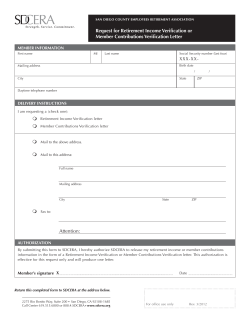
A How to borrow from your retirement savings WealthLinc
WealthLinc SEPTEMBER 2012 Brought to you by Our Team n RETIREMENT PLANNING How to borrow from your retirement savings Raskin Planning Group 125 Summer Street, Suite 1400 Boston, MA 02110 617.728.7433 peter.raskin@LFG.com Peter Raskin 617.728.7433 peter.raskin@LFG.com Jessie Foster 617.728.7436 jessie.foster@LFG.com Justin Makso 617.728.7432 justin.makso@LFG.com Rachel Mandeix 617.728.7464 rachel.mandeix@LFG.com A 401(k) loan can be a sensible alternative to other loan options for those who need access to funds. But executing such a move requires careful planning and an understanding of the long-term implications. If you need extra cash for a project or to cover a large expense, it may be tempting to use your 401(k) account as a financial lifeline. In fact, the number of Americans borrowing from their 401(k)s is on the rise, growing from 18% of plan participants in 2009 to 21% in 2010, according to the most recent report from the Employee Benefits Research Institute.1 “It’s definitely something people turn to in times of unusual need or a tight lending environment such as current conditions,” says Julie Stich, research director at the International Foundation of Employee Benefit Plans. “But while there are some advantages to borrowing from your 401(k), the list of drawbacks is at least as long.” For many people, a 401(k) loan should be the very last option, Stich says. Borrowing from your 401(k) puts your future retirement plans at risk, and you also face severe penalties if you don’t pay the money back on time. You could well have other options for raising cash—and should investigate them before you tap your retirement savings. THE LOAN BASICS Your employer dictates most of the rules for borrowing from your 401(k), within the bounds of regulations set by the IRS. Stich notes that CRN201202-2064444 1 while most employers do offer 401(k) loans, they aren’t required to. If your plan allows loans, there are certain rules you need to follow. You can borrow up to the lesser of either $50,000 or half your account balance. You must repay the loan within five years—but your employer can shorten the repayment term. And when you repay the loan, you’ll owe interest. For most 401(k) loans, the interest rate is pegged to the prime rate plus another one or two percentage points, Stich says. (The prime rate was recently 3.25%,2 which would put the average 401(k) loan rate at between 4.25% and 5.25%.) Stich notes that the reasonable rates and the fact that you avoid the application process of a commercial lender do make 401(k) loans attractive. “It’s definitely cheaper than running up credit card debt,” she says. THE DRAWBACKS But the potential disadvantages of borrowing from your retirement plan abound. Researchers estimate that more than 17% of 401(k) borrowers will fail to repay their loans this year.3 This leads to stiff penalties: You’ll owe income tax on the amount you haven’t repaid and a 10% early withdrawal fee on that amount if you’re younger than 59½. SEPTEMBER 2012 EXPLORE THE ALTERNATIVES About Our Practice Life is full of financial crossroads. Trying to navigate these paths without an experienced professional may lead to anxiety or wrong decisions. The Raskin Planning Group provides a unique approach to financial advice that combines experienced financial knowledge with personalized proactive service. Stich says there are other concerns as well. If you lose or change your job, your employer can ask that you immediately repay the loan. But the most worrisome consequences involve the effect such a loan could have on your overall retirement plan. Many borrowers aren’t able to simultaneously repay their loans and continue their regular contributions to their 401(k)s—causing their retirement savings to fall further behind. Then there’s the added drawback of depleting your retirement funds. “The purpose of your retirement plan is to save for retirement,” Stich says. “If you’re taking money out, your balance is lower for longer, and you miss out on all that compounding interest.” Before tapping into retirement savings, consider other ways to find or borrow the cash you need. For instance, one alternative is a home equity line of credit (HELOC). The interest rates on HELOCs are often lower than those on 401(k) loans, and the repayment schedules are usually more flexible. What’s more, you may be able to deduct the HELOC’s interest payments on your income tax return. Also consider meeting with your financial planner to weigh other options, from selling taxable investments to streamlining your budget to free up more cash. If you do choose to borrow from your 401(k), Stich advises that you proceed with caution. “Do your homework,” she says. “It’s important for individuals to understand what’s at stake.” TALK TO YOUR FINANCIAL PLANNER ABOUT: •Ways to plan for financial emergencies •Alternatives to borrowing from your retirement account •How you can borrow from your account without disrupting your overall retirement plan CRN201208-2071364 Employee Benefits Research Institute, “401(k) Plan Asset Allocation, 1 Account Balances, and Loan Activity in 2010,” Dec. 2011, http://www .ebri.org/publications/ib/index.cfm?fa=ibDisp&content_id=4968. The Wall Street Journal, Market Data Center, http://online.wsj.com 2 /mdc/public/page/2_3020-moneyrate.html. Blake Ellis, “Loan Defaults Drain $37 Billion From 401(k)s Each 3 Year,” CNNMoney, 17 July 2012, http://money.cnn.com/2012/07/17 /retirement/401k-loan-defaults/index.htm. The content of this material was provided to you by Lincoln Financial Advisors Corp. or Lincoln Financial Securities Corporation for its representatives and their clients. Any discussion pertaining to taxes in this communication (including attachments) may be part of a promotion or marketing effort. As provided for in government regulations, advice (if any) related to federal taxes that is contained in this communication (including attachments) is not intended or written to be used, and cannot be used, for the purpose of avoiding penalties under the Internal Revenue code. Individuals should seek advice based on their own particular circumstances from an independent tax advisor. Lincoln Financial Advisors Corp. and its representatives are not engaged in rendering accounting or legal/tax advice. If accounting or legal/tax services are required, an appropriate professional should be retained. CPAs and JDs with the firm do not provide legal or accounting services on behalf of Lincoln Financial Advisors Corp. Securities offered through Lincoln Financial Advisors Corp., a broker-dealer. Investment advisory services offered through Lincoln Financial Advisors or Sagemark Consulting, a division of Lincoln Financial Advisors, a registered investment advisor. Insurance offered through Lincoln affiliates and other fine companies. Lincoln Financial Group is the marketing name for Lincoln National Corporation and its affiliates. It is not our position to offer legal or tax advice. ©2000-2009 Lincoln National Corporation. All rights reserved. 2
© Copyright 2025












